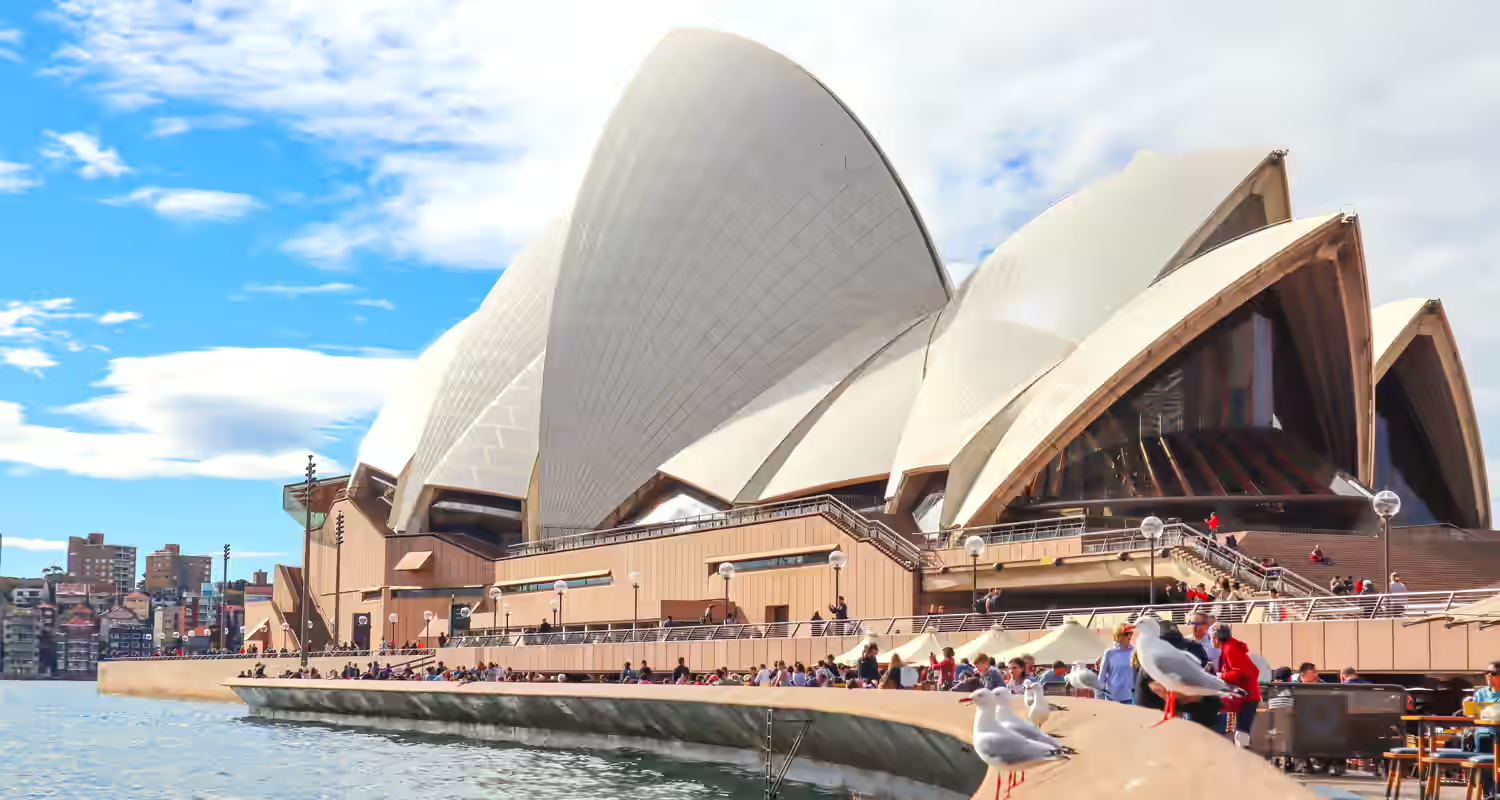
Study in Sydney, international student city guide
Sydney is one of Australia’s most iconic and cosmopolitan cities. Known for its stunning harbour, multicultural communities, and world-class universities, Sydney offers an enriching academic and personal experience.
With its beautiful beaches, cultural festivals, and strong job market, the city provides plenty of reasons to choose it as your study destination.
Sydney’s universities are internationally recognised, offering programs across fields such as business, engineering, arts, health, and technology. Thanks to strong ties with industry and government, students can get hands-on experience through internships and work placements.
Whether you’re drawn to innovative research or contemporary creative arts, Sydney offers a supportive learning environment in a truly global city.
Universities in Sydney
Public Universities
These are government-funded institutions that offer a wide range of undergraduate and postgraduate degrees. They are known for research, teaching quality, and accessibility.
- University of Sydney (USyd)
- University of New South Wales (UNSW Sydney)
- University of Technology Sydney (UTS)
- Macquarie University
- Western Sydney University (WSU)
Private Universities
Privately funded institutions that often focus on professional and career-oriented degrees. They may offer smaller class sizes and flexible learning.
- Australian Catholic University (ACU – North Sydney & Strathfield)
- Torrens University Australia (multiple Sydney campuses)
Specialist Institutions
These focus on specific fields like art, design, business, or theology, offering niche or highly specialised education.
- National Institute of Dramatic Art (NIDA)
- Australian Film, Television and Radio School (AFTRS)
- Sydney Institute of Business and Technology (SIBT)
- Moore Theological College
- SP Jain School of Global Management (Sydney campus)
TAFE Institutes (Technical and Further Education)
Public vocational institutions offering certificates, diplomas, and some degrees. Focused on practical, job-ready skills.
Related PostsGroup of 8 Universities
The Group of Eight (Go8) is a coalition of Australia’s leading research-intensive universities, known globally for academic excellence, impactful research, and strong ties with industry and international partners.
Two of Sydney’s prestigious universities belong to the Go8: the University of Sydney and UNSW Sydney. Both institutions consistently rank among the world’s top universities and are celebrated for their research strength, high-quality teaching, and diverse academic offerings across a range of fields.
Sydney university rankings 2025
Sydney is home to several globally ranked and respected universities.
To learn more about rankings and how to interpret them, see our University Rankings Explained article.
The table below summarizes their positions in the QS and Times Higher Education (THE) World University Rankings:
| University | QS World Ranking 2026 | THE World Ranking 2025 | Notable Strengths |
| UNSW Sydney | 20 | 83 | Known for engineering, business, law, innovation, and high graduate employability. |
| University of Sydney | =25 | 61 | Leadership in medicine, arts, law, and sustainability with strong global reputation. |
| University of Technology Sydney (UTS) | 96 | =154 | Leading in design, technology, innovation, and industry collaboration. |
| Macquarie University | =138 | 178 | Strong in linguistics, health sciences, business, and interdisciplinary research. |
| Western Sydney University | 400 | 301-350 | Recognised for community engagement, social sciences, and applied research impact. |
| Australian Catholic University (ACU) | 851-900 | 401-500 | Excel in education, nursing, social work, and health with strong community orientation. |
Cost of living and tuition fees
Sydney can be one of Australia’s more expensive cities to live in, but the post study career opportunities and good student services at universities will always make it a tempting choice for international students.
Typical annual costs for students include:
- Tuition: AUD 20,000–45,000 (varies by institution and course)
- Accommodation: AUD 10,000–18,000
- Food & groceries: AUD 4,000–6,000
- Transport: AUD 1,200–1,800 (with student concession)
- Other expenses (books, leisure): AUD 2,000–3,000
Visa and immigration information
Students from New Zealand don’t need a visa to study in Australia. If you are from outside of Australia or New Zealand then you should apply for a Student visa (subclass 500) before arrival. You can work part-time during their studies, and after graduating, and you could qualify for a Temporary Graduate visa (subclass 485) – letting you stay 2–4 years to build your career.
You can find out more about visa requirements and how to apply on our Australia student visa guide.
Student life in Sydney

With over 300,000 students, Sydney offers a vibrant and diverse campus life that blends academic, social, and cultural experiences. Universities and student-run clubs organise a wide range of events, from social gatherings and cultural celebrations to competitive sports and community volunteering.
Whether you’re new to the city or a returning student, there’s always something happening on campus and beyond.
Sydney’s iconic landmarks and natural beauty also enhance your student life. You can explore the Sydney Opera House and Harbour Bridge, relax at world-famous beaches like Bondi and Manly, or enjoy a walk through the Royal Botanic Gardens.
Popular activities include:
- Walking or swimming at Bondi Beach
- Attending outdoor concerts, film screenings, and festivals
- Exploring Sydney’s café culture, food trucks, and global cuisines
- Joining student clubs for hobbies, sports, or career interests
Support services at universities can help you feel at home, offering guidance for academics, wellbeing, and settling into life in Australia.
Sydney is generally a safe city for international students, but for more information about staying safe, read our top safety tips for international students.
Sign up to our regular email updates with advice on destinations, universities, scholarships and everything you need to prepare for studying overseas.
Sign up to our free emails nowGetting around Sydney
Sydney has a well-connected and reliable public transport system, making it easy for international students to get around the city. Trains, buses, ferries, and light rail services run frequently and cover most areas, including university campuses, city attractions, and suburbs.
Students can use an Opal card to access all modes of transport at discounted rates, with daily and weekly fare caps helping to keep costs manageable. Many students also choose to walk or cycle, especially in inner-city areas.
Career opportunities
Sydney’s economy is strong, diverse, and well-integrated with global markets, offering excellent job prospects for graduates across a wide range of industries. Key sectors include finance, technology, healthcare, education, tourism, and the creative arts.
As Australia’s financial hub, Sydney is home to major banks, investment firms, and multinational companies, as well as a growing number of startups and tech innovators. Government departments, NGOs, and cultural institutions also provide valuable internship and employment pathways.
Universities in Sydney actively support student employability through job fairs, employer networking events, career mentoring, and internship placement programs. Many degrees incorporate practical experience or industry projects to help you build relevant skills.
With its strong job market, supportive university services, and post-study visa options, Sydney provides a promising environment for students looking to launch successful careers in Australia or internationally.
Pros and cons of studying in Sydney
Pros:
- Prestigious universities with global rankings
- Beautiful setting with beaches, parks, and cultural landmarks
- Strong internship and graduate opportunities
- Diverse, international student community
- Excellent public transport and student support services
Cons:
- Higher living costs than other Australian cities
- Competitive housing market, especially near campuses
- Varying climate – hot summers and wet winters
- Visa and work permit rules can be complex
